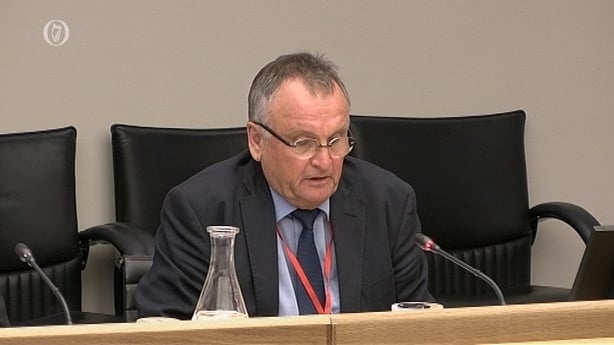The authors of report into the operation of the Oberstown Detention Centre have said they observed practices in the care of children at the centre that disturbed them.
Professor Nick Hardwicke told the Oireachtas Committee on Children and Youth Affairs that on the last visit to Oberstown on the 8 November 2016, the authors were so concerned about what was happening to one child that they made a safeguarding referral.
The committee is inquiring into why the Government has continued to refuse to publish the report.
Minister for Children Katherine Zappone has published the report's recommendations but not the full report.
The authors also rejected "fair procedures" as a reason for a refusal to publish, telling the committee members that no individuals were referred to in the report in a critical way, apart from perhaps the chair and the director and the authors met with them throughout the process.
They also said the HIQA report published after their report did not reassure them that the issues highlighted had been addressed including failures in dealing with children and staff management.
Ms Zappone commissioned the report following serious disturbances at the detention centre including property damage, protests by juvenile offenders there and a fire which cost over €3 million in 2016.
Professor Barry Goldson told the committee that the reasons they were given for not publishing the full report are "flawed".

The authors called for the full report to be published in the interests of transparency and accountability, the public good, and to enable lessons to be learned
Prof Goldson also said the right lessons will not be learned unless there is a full understanding of what happened in the past.
He said a HIQA report published last year, more than a year after they had finished their report, raised serious concerns about a number of issues including child protection and staffing at Oberstown.
The authors described the failure to publish their report as breach of their contract.
We need your consent to load this rte-player contentWe use rte-player to manage extra content that can set cookies on your device and collect data about your activity. Please review their details and accept them to load the content.Manage Preferences
Committee chairman Alan Farrell said legal advice which the Minister for Children said is one reason for not publishing the report cost over two and a half times more than the actual report itself.
The Fine Gael TD said the legal advice cost €26,000 while the report itself cost €10,000.
Profs Goldson and Hardwicke said that while Oberstown has improved since the report was finished, "there is clearly a way to go".
Fianna Fáil TD Lisa Chambers said that people may feel the report is not being published as part of "a cover up" and "to protect the wrong people".
The chairperson of the board of management at Oberstown told the committee that the decision of the board not to publish the report was taken on the advice that publishing it would be "fraught with legal risk".
Professor Ursula Kilkelly said: "The decision not to publish this report was taken by the board following a process of exceptional care and diligence. This decision was not one that the board wanted to make."
She also said that it was the full intention of the board to publish the report, but they were "regrettably left with no alternative when the serious legal risks associated with publication were brought to our attention".
Prof Kilkelly said that the legal advice said that placing the report in the public domain would be fraught with legal risk in the absence of the protections of fair procedures and due process that Irish law requires.
She said that "there is no cover-up" behind the reason not to publish the independent report.
Following questions from Sinn Féin TD Denise Mitchell, Prof Kilkelly pointed out that Oberstown is one of the most scrutinised organisations in the country and measures have been taken to improve transparency and accountability.
She said: "I completely understand your frustration around the recommendations but from our point of view, it had to be safe to place the full report in the public domain. And very regrettably that was the stumbling block that we came across.
"We had to just deal with the reality of the risk that was presented at that time in the way we did. I am absolutely confident that if we did it again, it could be done differently. But there is no cover-up."







